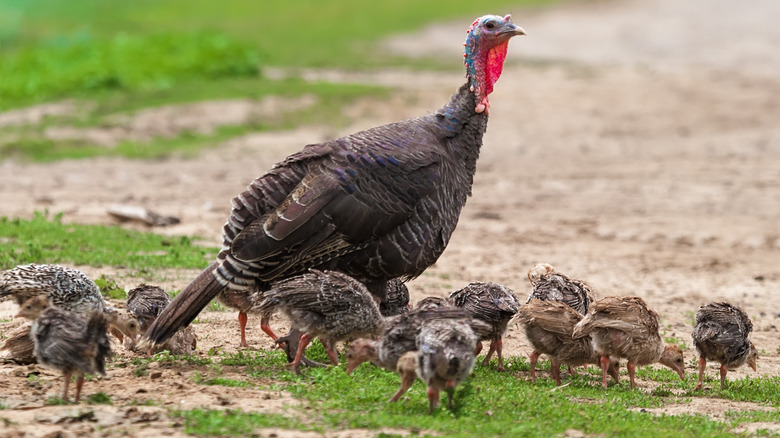This Is Why You Won't Find Turkey Eggs At The Store
Who doesn't love eggs? Delicious, nutritious, and oh-so-versatile, they're a star of the breakfast table and an essential ingredient in countless dishes.
Over the past couple of decades, egg consumption in the U.S. has risen steadily, from about 250 eggs per person per year in 2000, to about 288 in 2021 (via Statista). This has a lot to do with the redemption of the egg. For years, medical authorities and journals had warned that eating too many eggs could lead to an increased risk of heart disease, due to their high cholesterol content. But more recently, several studies have shown that while there's no definitive link between egg consumption and heart disease, eggs definitively do contain a variety of healthy compounds, including vision-boosting lutein (via BBC).
If you're in the egg-loving camp, you may have noticed that over the past few years, as demand for eggs has risen, grocery stores and farmers markets have expanded their options to include a boggling array of organic, free-range, and cruelty-free eggs (via Bon Appétit) — as well as eggs from other fowl, including quail and duck. There seem to be more egg choices than ever these days — but have you ever wondered why you've never seen turkey eggs for sale? Unless you're good friends with a turkey farmer, you might never get to taste the eggs from this bird (via Modern Farmer).
Turkey eggs don't make economic sense for farmers
It doesn't seem to make sense: If commercial turkey meat is widely available — just like chicken — then why not their eggs? According to Modern Farmer, it comes down to economics. To justify the expense of raising turkey eggs, farmers would have to charge about $3 per egg, or $36 a dozen. You can get a lot more chicken eggs for that price.
Why so expensive? Modern Farmer explains that while chickens and ducks lay about one egg per day, a turkey typically lays just two per week. Turkeys don't even start laying until they reach seven months, versus chickens who start laying at five months. And since turkeys require more space and food to raise than chickens, it's expensive for farmers to maintain the birds while waiting.
Given the costs involved in getting turkey eggs to market, a fertilized egg — for breeding the next generation — is simply much more cost effective for farmers than one sold for human consumption.

